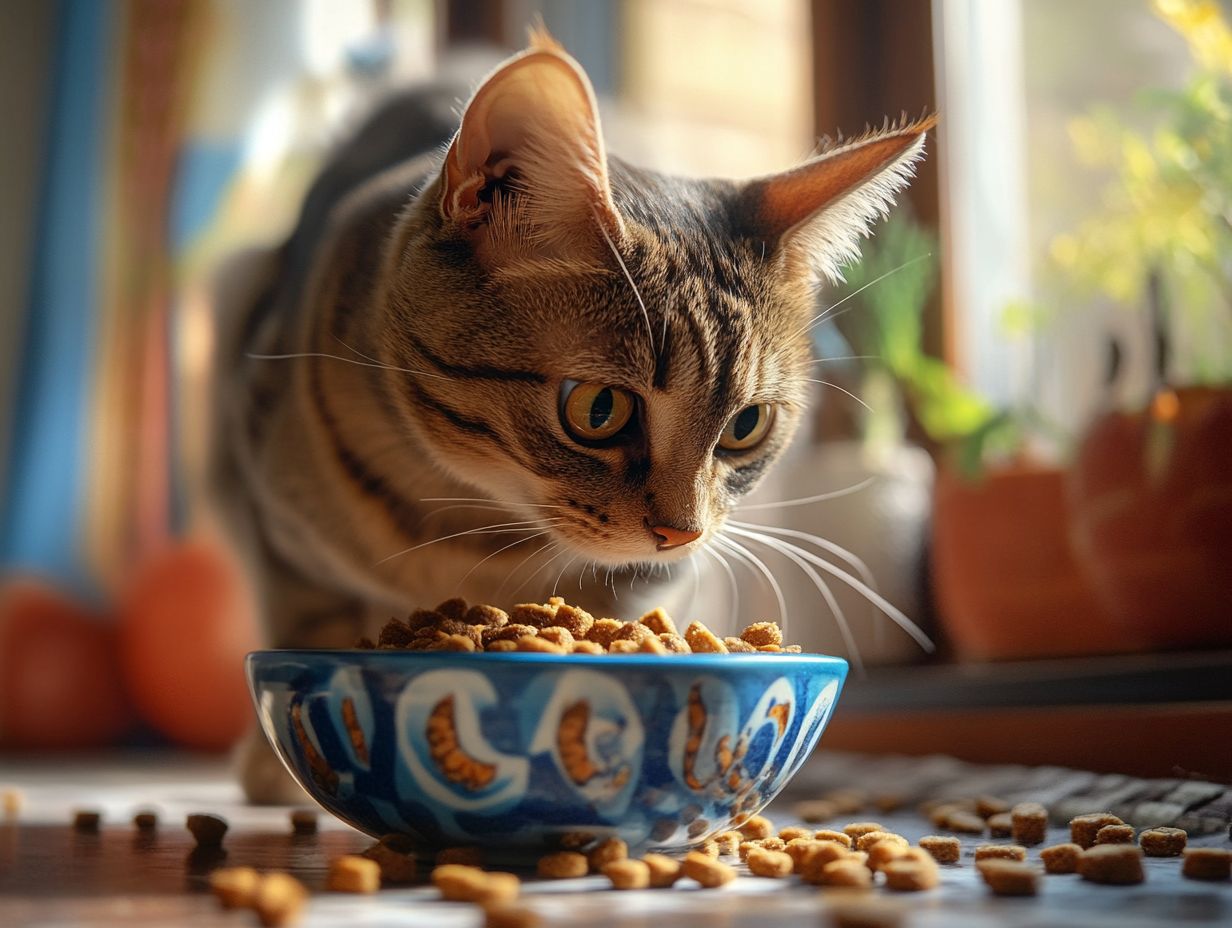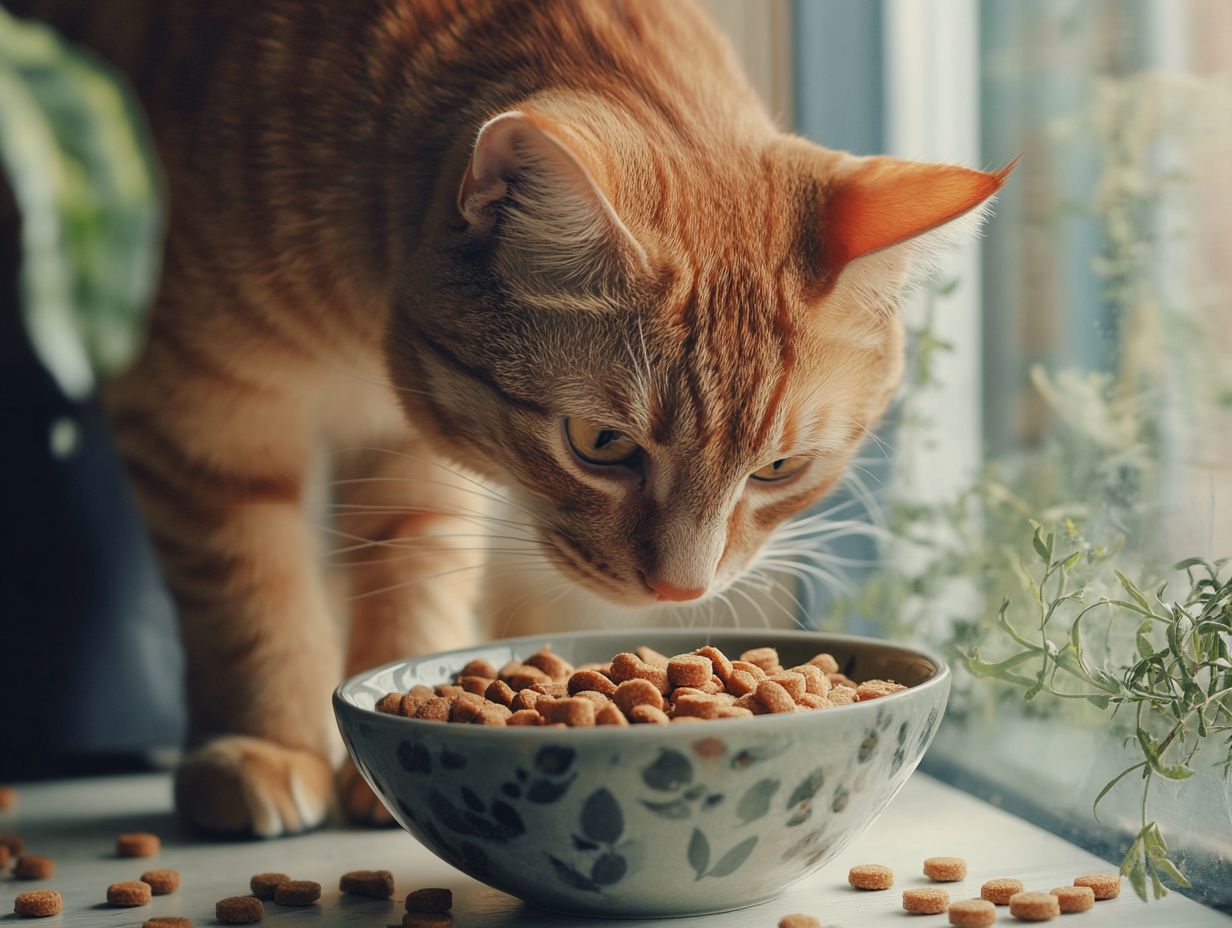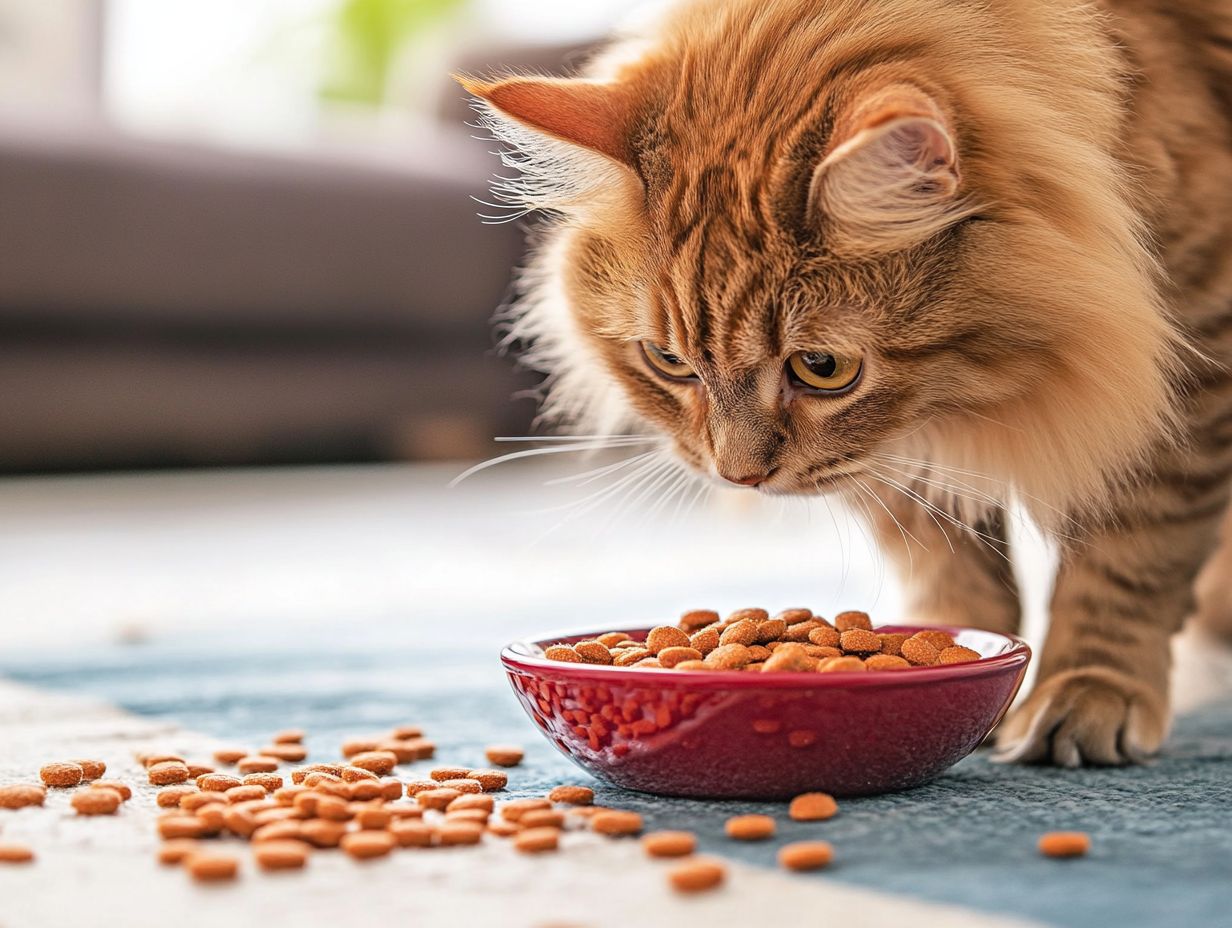Navigating your cat’s dietary needs, including managing skin allergies and digestive issues, can be a challenging task, especially when health issues arise.
Prescription cat food, also known as therapeutic diets, is specially formulated to address specific medical conditions and can significantly improve your pet’s quality of life when used under the guidance of a veterinarian.
This article explores prescription cat food, including why it’s often recommended, which cat health conditions it addresses, and the benefits and risks of long-term use.
Learn how to manage your cat’s health effectively, considering various cat food types, and make informed choices for their nutrition.
Key Takeaways:

What Is Prescription Cat Food?
Prescription cat food is specifically formulated to address the unique dietary needs of cats with particular health conditions. It often includes hydrolyzed protein options that help manage food allergies, gastrointestinal symptoms, and other chronic health issues.
Veterinarians commonly recommend this type of cat food, which plays a crucial role in supporting immune health, digestive health, and overall well-being. This is especially important for cats suffering from chronic kidney disease, diabetes, or inflammatory bowel disease.
Why Is Prescription Cat Food Recommended?
Veterinarians recommend prescription cat food because it addresses specific health issues, enhances nutrient absorption, and significantly alleviates symptoms of food allergies and gastrointestinal problems commonly found in cats with sensitive stomachs by providing targeted dietary management.
What Are the Common Health Conditions that Require Prescription Cat Food?
- Chronic kidney disease: Requires higher quality protein with lower phosphorus content.
- Inflammatory bowel disease: Needs a highly digestible diet to alleviate gastrointestinal stress.
- Food allergies: Demands specific formulas that exclude common allergens.
- Gastrointestinal disorders: May benefit from specialized diets tailored to digestive health.
As a cat owner aiming to improve your pet’s health, it is essential to understand these key conditions. By addressing these dietary needs, prescription cat food not only helps reduce symptoms but also promotes long-term health, resulting in a better quality of life for affected felines.
How Long Can Cats Be on Prescription Cat Food?
The length of time a cat may need to be on a prescription diet depends on individual health conditions, dietary management requirements, and veterinary guidance.
Some cats may require long-term feeding of specialized diets due to chronic digestive diseases or other ongoing health issues, necessitating specific therapeutic diets.
What Are the Benefits of Long-Term Use of Prescription Cat Food?
The long-term use of prescription cat food offers several advantages, including effective management of chronic health conditions, improved digestion and nutrient absorption, assistance with weight management, and a reduction in allergic reactions through hypoallergenic diets.
These benefits make prescription cat food essential for many cats. However, it is important to monitor your cat’s health while on a prescription diet, including regular veterinary check-ups and adjustments to the diet as needed.
Potential Nutritional Deficiencies
Long-term use of prescription diets may lead to nutritional deficiencies if not properly managed. It’s essential to consider the dietary requirements of different types, such as raw, vegan, or homemade diets, and to ensure a balanced intake of necessary nutrients.
Risks of Non-Prescription Food
Feeding cats non-prescription food can pose serious risks, especially if they have specific dietary restrictions due to allergies or other health conditions. Always consult a veterinarian before making any changes to your cat’s diet.
Feeding Protocols for Different Life Stages
Prescription diets may need to be adjusted based on your cat’s life stage, including kittens, seniors, and pregnant or nursing cats, each requiring unique nutritional considerations.
Importance of Food Storage
Proper food storage and handling techniques are crucial to prevent spoilage and maintain the efficacy of prescription diets. Follow the manufacturer’s guidelines for optimal storage conditions.
Ethical Considerations
When considering long-term use of prescription diets, it’s important to think about sustainability and sourcing of animal proteins. However, the health of your cat should always be the top priority.
Conclusion
In summary, prescription cat food plays a vital role in managing various health conditions in cats. Always work closely with your veterinarian to ensure that your pet receives the best possible care.
One of the primary benefits of prescription cat food is the improved management of chronic health conditions, as it is specifically tailored to meet the dietary needs associated with issues such as chronic kidney disease and inflammatory bowel disease. These specialized diets are formulated with precise ingredients, including hydrolyzed protein options, which are produced by breaking down proteins into smaller fragments, making them easier for cats to digest and less likely to trigger allergic reactions. It is essential for pet owners to consult veterinary guidance when selecting a suitable prescription diet, as a professional can evaluate the individual needs of each cat based on their unique health status and ensure adherence to current veterinary nutritional research and guidelines from organizations such as AAFCO and WSAVA.
This collaborative approach ensures that pets receive the right nutrition to enhance their quality of life while effectively managing their chronic conditions.
2. Better Digestion and Nutrient Absorption
Prescription cat food options are designed to enhance digestion and nutrient absorption, thereby alleviating gastrointestinal symptoms in cats with sensitive stomachs or food intolerances. These specialized diets often contain hydrolyzed proteins, making them easier for a cat’s digestive system to process and reducing the likelihood of adverse reactions.
Additionally, omega-3 fatty acids contribute to gut health through their anti-inflammatory properties, which help soothe the gut lining and make meals more enjoyable for the cat. By tailoring the cat food ingredients in these foods, manufacturers not only promote improved digestion but also support a healthier overall lifestyle for the cat.
3. Weight Management
The third benefit of prescription cat food is its effectiveness in weight management. Many prescription diets are designed to help cats achieve and maintain a healthy weight, and in some cases, facilitate weight loss by addressing their specific dietary needs, particularly for those with chronic conditions requiring kidney care or diabetes care.
These diets typically feature carefully balanced ratios of protein, fat, and fiber, allowing pets to feel full for longer while preventing excessive calorie intake. For instance, increasing the fiber content may help cats feel satiated while also promoting healthy digestion, making it easier for them to manage their appetite and nutritional requirements.
Additionally, these diets often incorporate portion control measures and feeding schedules tailored to a cat’s individual metabolic rate. By employing these nutritional strategies, veterinarians can provide effective feeding advice for personalized feeding regimens that address weight-related concerns such as obesity, diabetes, or kidney health issues.
4. Reduced Allergic Reactions
The primary benefit of prescription cat food is its ability to reduce allergic reactions in cats, particularly those with food allergies. Formulated to be hypoallergenic, these diets minimize exposure to allergens. They contain specific protein sources that are less likely to trigger immune responses, such as novel protein sources like duck or rabbit, and are designed to limit carbohydrate content, which helps to manage dietary sensitivities.
Additionally, incorporating easily digestible components helps maintain overall gastrointestinal health, thereby promoting the pet’s well-being and reducing the likelihood of allergic reactions, thus enhancing their feline nutrition.
What Are the Risks of Long-Term Use of Prescription Cat Food?
Although prescription cat food can offer certain benefits, the potential risks associated with long-term use—such as nutrient deficiencies, unnecessary expenses, and possible side effects—underscore the importance of seeking veterinary advice from veterinary clinics regarding the suitability of prescription diets for cats. To monitor for signs of nutrient deficiencies, regular veterinary check-ups are essential to adjust dietary plans as needed.
1. Nutrient Deficiencies
Long-term use of prescription cat food can lead to nutrient deficiencies if the diets are not adequately balanced or fail to adapt to a cat’s increasing physical needs. Here are some examples of potential deficiencies that may arise from the prolonged use of certain prescription cat foods: For more information, check out Long-Term Use of Prescription Cat Food: What You Need to Know.
Practical Feeding Advice
When managing a cat’s nutritional needs on a prescription diet, consider the following:
- Follow the veterinarian’s recommendations regarding portion sizes and feeding frequencies.
- Ensure proper food storage and handling to prevent spoilage, and be aware of signs of spoilage.
- Address any potential allergen safety concerns associated with specific protein sources and additives used in prescription diets.
Lastly, while raw or homemade diets may offer potential benefits, they also carry risks; thus, it is strongly recommended to consult with a veterinary professional before transitioning to any non-prescription diet.
Disclaimer: Always consult with a veterinarian before making any dietary changes, especially for cats with specific health conditions.
- Taurine Deficiency: Taurine is an essential amino acid that cats cannot produce on their own. An insufficient intake of taurine can result in feline dilated cardiomyopathy (FDCM) or retinal degeneration. It is crucial to ensure adequate levels through high-quality, animal-source proteins.
- Omega-3 Fatty Acid Deficiency: A diet low in omega-3 fatty acids over an extended period may negatively affect coat and skin health, potentially leading to dry and irritated skin and coat. Consult your veterinarian for guidance on appropriate supplementation.
- Omega-6 Fatty Acid Deficiency: Similarly, a deficiency in omega-6 fatty acids can cause a scaly coat and skin issues, emphasizing the importance of balanced fats in a cat’s diet.
- Vitamin B12 Deficiency: Vitamin B12 (Cobalamin) is crucial for energy metabolism, and a deficiency may manifest as lethargy or weakness. Discuss specific nutrient profiles with your veterinarian, especially for cats with health conditions.
- Vitamin D3 Deficiency: Vitamin D3 plays a vital role in calcium absorption and bone health. A diet that is too low in calcium or has an inappropriate calcium-to-phosphorus ratio can lead to bone-related health problems as cats age. Ensure your cat’s diet aligns with current AAFCO standards.
2. Unnecessary Expense

For cat owners, one of the most significant risks associated with long-term use of prescription cat food is the financial burden it imposes, especially if the prescription diet is not essential for medical management or could be substituted with a high-quality commercial cat food. This financial strain can lead to added stress, particularly for owners who are already facing financial challenges due to other veterinary care expenses.
Prescription cat foods are typically much more expensive than traditional cat foods, potentially becoming an unwanted cost that affects the overall family budget. While both dog and cat owners should be aware of the dietary requirements for their pets, it is essential to recognize that not every cat needs a prescription veterinary diet. Engaging in open discussions with your veterinarian can help clarify these needs.
Pet parents should discuss this matter with their veterinarian to determine the best course of care for their cat. Regular veterinary visits can help ascertain whether the prescription diet remains necessary and can identify cost-effective alternatives that may provide better overall health benefits for the cat.
3. Potential Side Effects
Long-term use of prescription cat food can lead to gastrointestinal side effects, which may arise due to a cat’s changing tolerance levels or sensitivities to specific ingredients. This underscores the critical role pet owners play in closely monitoring their pets for any changes in behavior or digestive health.
Additionally, veterinary guidance can aid in identifying potential negative side effects that may not be immediately apparent. For instance, if a cat is vomiting, experiencing diarrhea, or showing a lack of appetite, it may struggle to process the food. Owners should also be aware of potential allergens and toxic ingredients.
Regular visits to the veterinarian are essential to ensure timely adjustments or further tests if the cat encounters any gastrointestinal issues.
How to Properly Use Prescription Cat Food for Long-Term Health Management?
Achieving long-term health management with prescription cat food involves adhering to proper feeding guidelines, consulting with a veterinarian, and regularly monitoring the cat’s health to ensure that its dietary needs are being met. This includes understanding the unique nutritional profiles for special needs, like kidney disease or diabetes.
1. Consult with a Veterinarian
Consulting with a veterinarian is crucial when introducing or maintaining a prescription cat food regimen, as they can offer advice tailored to a cat’s specific medical conditions and nutritional management needs.
Veterinary consultations provide valuable insights into the nutritional requirements of cats, particularly those with underlying medical issues such as diabetes, renal disease, or obesity. Experts can assist in selecting the right food that aligns with a cat’s taste and texture preferences while also supporting their health.
Regular check-ups are essential to ensure that the diet can be adjusted promptly as the cat’s condition evolves. These adjustments can help prevent complications and enhance the quality of life, ensuring that the cat receives the proper nutrition vital for recovery and longevity.
2. Monitor Your Cat’s Health and Adjust Diet as Needed
The effectiveness of prescription cat food in managing long-term health issues in cats is optimized when owners regularly monitor their pets’ health and diet, making adjustments as necessary. This monitoring can involve tracking changes in weight, assessing coat quality, and evaluating overall energy levels, as these factors may indicate that the current diet is not adequately meeting their nutritional needs.
3. Food Storage and Handling Practices
Proper storage and handling of cat food are essential to ensure freshness and prevent spoilage. Store food in a cool, dry place, and always seal bags tightly after use. Be vigilant for signs of spoilage, such as unusual odors or changes in texture.
4. Ethical and Sustainability Considerations
While focusing on your cat’s health is paramount, consider the ethical and sustainability issues surrounding pet food production. Seek brands that prioritize humane sourcing and environmentally friendly practices.
Additionally, behavioral changes such as increased lethargy or shifts in appetite could suggest that the cat may benefit from dietary modifications. These signs both indicate when adjustments are needed and highlight the importance of collaborating with a veterinarian.
A veterinarian’s expertise can aid in both monitoring and adjusting diets, ensuring that the cat receives the proper nutrients tailored to their unique health requirements.
3. Consider Alternatives to Prescription Cat Food
While prescription cat food can be beneficial for many cats, pet owners should also consider alternatives, such as non-prescription commercial cat food, which adheres to AAFCO standards. Examples include brands like Hill’s Science Diet or Royal Canin.
These alternatives may include premium brands designed for specific medical conditions that comply with AAFCO nutrient profiles, or homemade meals made from fresh ingredients tailored to an individual cat’s requirements. It is crucial to consult with a veterinary nutritionist when creating homemade diets to avoid nutritional deficiencies.
However, it is essential for pet owners to consult with a veterinarian before making any changes to ensure that these alternatives are safe and beneficial. Proper guidance can help avoid potential pitfalls while ensuring that the cat receives the necessary nutrients. Homemade meals should be balanced and consider the risks of allergens and toxic ingredients like onions or garlic.
Frequently Asked Questions

What is prescription cat food and why is it necessary for long-term use?
Prescription cat food is a specialized type of food that is formulated to address specific health conditions in cats, such as weight management or urinary tract issues. It may contain different ingredients and nutrient levels than regular cat food. It is necessary for long-term use when a cat has a chronic health condition that requires ongoing management.
How is prescription cat food different from regular cat food?
Prescription cat food is specifically designed to address certain health issues, while regular cat food is more general and may not meet the specific dietary needs of cats with health conditions. Prescription cat food may also require a veterinary prescription to purchase, while regular cat food can be bought over-the-counter.
Can prescription cat food be used as a preventive measure?
Yes, in some cases prescription cat food can be used as a preventive measure. For example, if your cat is at risk for developing a certain health condition, your veterinarian may recommend a prescription diet to help prevent its onset. However, always consult with your veterinarian before starting your cat on any new diet.
What are the potential risks of long-term use of prescription cat food?
The risks of long-term use of prescription cat food are minimal, but it is important to monitor your cat’s health and weight while on the diet. Some cats may experience weight gain or loss, digestive issues, or changes in coat quality. Periodic veterinary check-ups are crucial to assess ongoing dietary needs and health status. If you notice any negative changes, consult with your veterinarian for adjustments to the diet.
Can prescription cat food be used in combination with other treatments?
Yes, prescription cat food can often be used in combination with other treatments, such as medication or supplements. In fact, it may be recommended by your veterinarian as part of a comprehensive treatment plan for your cat’s health condition. Always follow your veterinarian’s instructions and consult with them before making any changes to your cat’s treatment plan.
How can I ensure my cat is getting the proper nutrition while on a prescription diet?
It is important to follow your veterinarian’s recommendations and feeding instructions for the prescription cat food. You should also monitor your cat’s body condition and weight regularly to ensure they are maintaining a healthy weight. If you have any concerns about your cat’s nutrition, consult with your veterinarian for advice and potential adjustments to the diet.
What are the unique dietary needs of cats at different life stages?
Cats have varying dietary requirements at different life stages, including kittens, seniors, and pregnant or nursing cats. Prescription diets may cater to these unique needs by providing specific nutrient profiles that support growth, maintenance, and reproductive health. Consult your veterinarian to determine the best dietary options for your cat’s life stage.